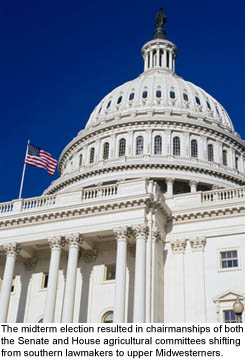Farm Bill Will Be Hammered Out in Coming Months
Farm Bill Will Be Hammered Out in Coming Months

In the coming months federal lawmakers will begin hammering out a new five-year farm bill. Changes in Congress from the recent midterm elections, international trade agreements and the federal deficit will all factor into the new bill.
Larry Jones, an economist from the University of Kentucky College of Agriculture, said the general feeling among economists and other farm policy watchers is that when the dust settles the bill will look much like its 2002 predecessor. However, no one really knows.
“It’s a very fluid situation,” he said.
The midterm election resulted in chairmanships of both the Senate and House agricultural committees shifting from southern lawmakers to upper Midwesterners. What impact this will have on farm legislation is not yet clear. However, the traditional farm program crops of corn, wheat and soybeans are the main crops in the Midwest, adding to the argument that little will change, Jones said.
On the other hand, U.S. Rep. Nancy Pelosi, the incoming Speaker of the House, is from California where many of the nontraditional program crops are grown. These producers are expressing a desire for their crops to also be a part of farm legislation.
During a recent speech to the Kentucky Farm Bureau Federation, U.S. Secretary of Agriculture Mike Johanns noted that 60 percent of farmers in the United States do not receive the direct cash support that farm programs are often noted for, because they do not grow “program crops.” While often referred to as specialty crops, these crops are now equal in value to program crops, he said. This issue has been discussed at many farm bill forums in the past few months and some programs for these specialty crops could be a part of the 2007 farm bill.
“We have the chance every few years to evaluate what policies have been working for us and what policies might be improved,” Johanns said. “I am a firm believer in providing federal support for agriculture. I think it is a very wise federal investment. It is also critical that we consider whether agricultural support is equitable, predictable and beyond challenge.”
Steve Riggins, UK grains marketing specialist, noted that prices are good and are expected to remain strong for traditional program crops so the government payout likely will be smaller for these programs. That may allow some additional spending on new program crops or conservation programs without adding to the overall cost of farm programs.
Another issue that could come into play in the coming months is the large federal deficit. Farm policy is expensive so the question of availability of funds could become a factor, Jones said.
Farm programs are also impacted by international trade. The most recent round of talks for the World Trade Organization, called the Doha Round, fell apart primarily over the issue of farm subsidies in the United States and other developed counties.
Johanns said the 2007 farm bill must protect America’s farmers while allowing for fair international trade. International trade is vital, he noted with exports expected to hit a record $77 billion in 2007. In Kentucky, $1 billion of the state’s $4 billion cash farm receipts are exported.
UK’s Jones noted that in order to get trade negotiations back on track, negotiators’ will have to decide what they are willing to give up.